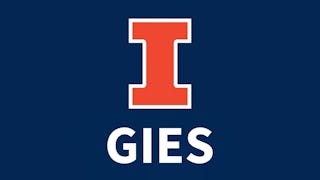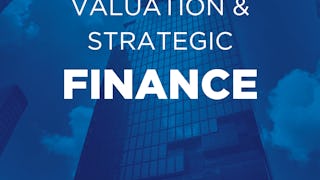This course is a comprehensive, step-by-step learning journey into the practical construction and interpretation of financial models, designed around the real-world case of Big Books Corp. Participants will learn how to analyze historical data, calculate key financial drivers, and forecast segment-wise revenues, expenses, and cash flows. The course guides learners through constructing income statements, balance sheets, and cash flow statements, progressing into evaluating capital expenditures, depreciation schedules, and working capital cycles.

Découvrez de nouvelles compétences avec 30 % de réduction sur les cours dispensés par des experts du secteur. Économisez maintenant.


Ce que vous apprendrez
Build and interpret income statements, balance sheets, and cash flows in Excel.
Compute valuation metrics including NPV, FCFF, FCFE, and DCF models.
Apply relative valuation techniques and assess peer company performance.
Compétences que vous acquerrez
- Catégorie : Financial Modeling
- Catégorie : Operating Expense
- Catégorie : Expense Management
- Catégorie : Cash Flows
- Catégorie : Depreciation
- Catégorie : Equities
- Catégorie : Financial Forecasting
- Catégorie : Income Statement
- Catégorie : Financial Statements
- Catégorie : Return On Investment
- Catégorie : Cash Flow Forecasting
- Catégorie : Excel Formulas
- Catégorie : Revenue Forecasting
- Catégorie : Business Valuation
- Catégorie : Financial Analysis
- Catégorie : Working Capital
- Catégorie : Capital Expenditure
Détails à connaître

Ajouter à votre profil LinkedIn
septembre 2025
24 devoirs
Découvrez comment les employés des entreprises prestigieuses maîtrisent des compétences recherchées

Il y a 8 modules dans ce cours
This module introduces learners to the business structure of Big Books Corp and lays the foundation for constructing a robust financial model. It begins by examining the company's revenue streams and segment-wise performance over time. Learners will explore how to apply growth assumptions for forecasting sales and understand the fundamental purpose and strategic significance of financial models. The module then transitions into calculating total revenue across segments and preparing for cost-based modeling. By the end of this module, learners will be equipped to evaluate historical performance, forecast future revenues, and contextualize financial modeling in real-world investment analysis.
Inclus
6 vidéos3 devoirs
This module focuses on the operational expenditure elements that influence profitability within a financial model. Learners will explore techniques to project SG&A expenses using rational, defensible assumptions and link those expenses with revenue in a structured income statement. The module also covers key asset components such as Gross PPE and capital expenditures, introducing the logic of depreciation and segment-wise Capex forecasting. By the end of this module, learners will be able to structure interconnected expense and asset flows within a cohesive financial framework.
Inclus
5 vidéos3 devoirs
This module builds on capital expenditure modeling by introducing learners to the concepts and calculations behind depreciation and amortization in financial forecasting. It begins with deriving capital expenditures from PPE values and walks through asset-specific depreciation schedules, including machinery and automobiles. The module then transitions into amortization of intangible assets and explains how these non-cash expenses are linked into financial statements. By the end, learners will understand how to generate, validate, and integrate depreciation and amortization schedules into a comprehensive financial model.
Inclus
5 vidéos3 devoirs
This module introduces learners to the process of constructing the cash flow statement and managing working capital within a financial model. It begins by guiding learners through the indirect method of building the cash flow statement using data from the income statement and balance sheet. The module then transitions into the fundamentals of working capital — including its components, historical linkage, and forecasting logic — culminating in the understanding of the cash conversion cycle and the impact of changes in current assets and liabilities on overall cash flow. By the end of the module, learners will be equipped to analyze, project, and integrate working capital effectively in dynamic financial models.
Inclus
6 vidéos3 devoirs
This module focuses on modeling equity and debt-related components of a financial model, particularly the capital structure. Learners begin by forecasting share repurchase activities and understanding their effect on treasury stock and shares outstanding. The module then transitions into handling other assets and liabilities, projecting debt balances, and computing interest income and expense. It concludes with integrating these elements into the income statement, balance sheet, and cash flow statement. By the end of the module, learners will be able to structure and link equity and financing assumptions across financial reports to ensure consistency and accuracy.
Inclus
7 vidéos3 devoirs
This module introduces learners to valuation fundamentals with a focus on the Discounted Cash Flow (DCF) method. It begins by ensuring the model is structurally sound using a dashboard review, then transitions into DCF mechanics—covering Free Cash Flow to the Firm (FCFF), backward calculation methods, and Free Cash Flow to Equity (FCFE). The module emphasizes the significance of forecasting cash flows, understanding capital structure adjustments, and interpreting Net Operating Profit After Tax (NOPAT) to derive firm and equity value. Learners complete the module with a foundational ability to apply and evaluate a DCF valuation in practical financial models.
Inclus
7 vidéos3 devoirs
This module builds upon foundational valuation techniques and introduces advanced applications critical for equity valuation. It focuses on completing the DCF (Discounted Cash Flow) model by aligning enterprise value with equity value and interpreting capital structure implications. Learners explore the derivation and interpretation of Beta, risk-free rate, cost of capital, and WACC (Weighted Average Cost of Capital), enabling them to assess investment risk and accurately estimate the value of a business. Through hands-on integration of market-based inputs and theoretical principles, this module reinforces precision in financial model assumptions and valuation outputs.
Inclus
7 vidéos3 devoirs
This module provides a comprehensive understanding of final valuation outputs and their practical interpretations. Learners explore how to derive enterprise value and share price from DCF models and apply comparative valuation techniques using market multiples such as EV/Revenue and EV/EBITDA. The module emphasizes how to bridge intrinsic valuation with relative benchmarks and equips learners with the tools to evaluate company value through both forecast-driven and market-driven approaches. This dual approach strengthens analytical skills necessary for real-world valuation scenarios.
Inclus
7 vidéos3 devoirs
Obtenez un certificat professionnel
Ajoutez ce titre à votre profil LinkedIn, à votre curriculum vitae ou à votre CV. Partagez-le sur les médias sociaux et dans votre évaluation des performances.
En savoir plus sur Finance
 Statut : Essai gratuit
Statut : Essai gratuitUniversity of Illinois Urbana-Champaign
 Statut : Essai gratuit
Statut : Essai gratuitFundação Instituto de Administração
 Statut : Essai gratuit
Statut : Essai gratuitUniversity of Pennsylvania
Pour quelles raisons les étudiants sur Coursera nous choisissent-ils pour leur carrière ?





Ouvrez de nouvelles portes avec Coursera Plus
Accès illimité à 10,000+ cours de niveau international, projets pratiques et programmes de certification prêts à l'emploi - tous inclus dans votre abonnement.
Faites progresser votre carrière avec un diplôme en ligne
Obtenez un diplôme auprès d’universités de renommée mondiale - 100 % en ligne
Rejoignez plus de 3 400 entreprises mondiales qui ont choisi Coursera pour les affaires
Améliorez les compétences de vos employés pour exceller dans l’économie numérique
Foire Aux Questions
To access the course materials, assignments and to earn a Certificate, you will need to purchase the Certificate experience when you enroll in a course. You can try a Free Trial instead, or apply for Financial Aid. The course may offer 'Full Course, No Certificate' instead. This option lets you see all course materials, submit required assessments, and get a final grade. This also means that you will not be able to purchase a Certificate experience.
When you purchase a Certificate you get access to all course materials, including graded assignments. Upon completing the course, your electronic Certificate will be added to your Accomplishments page - from there, you can print your Certificate or add it to your LinkedIn profile.
You will be eligible for a full refund until two weeks after your payment date, or (for courses that have just launched) until two weeks after the first session of the course begins, whichever is later. You cannot receive a refund once you’ve earned a Course Certificate, even if you complete the course within the two-week refund period. See our full refund policy.
Plus de questions
Aide financière disponible,




